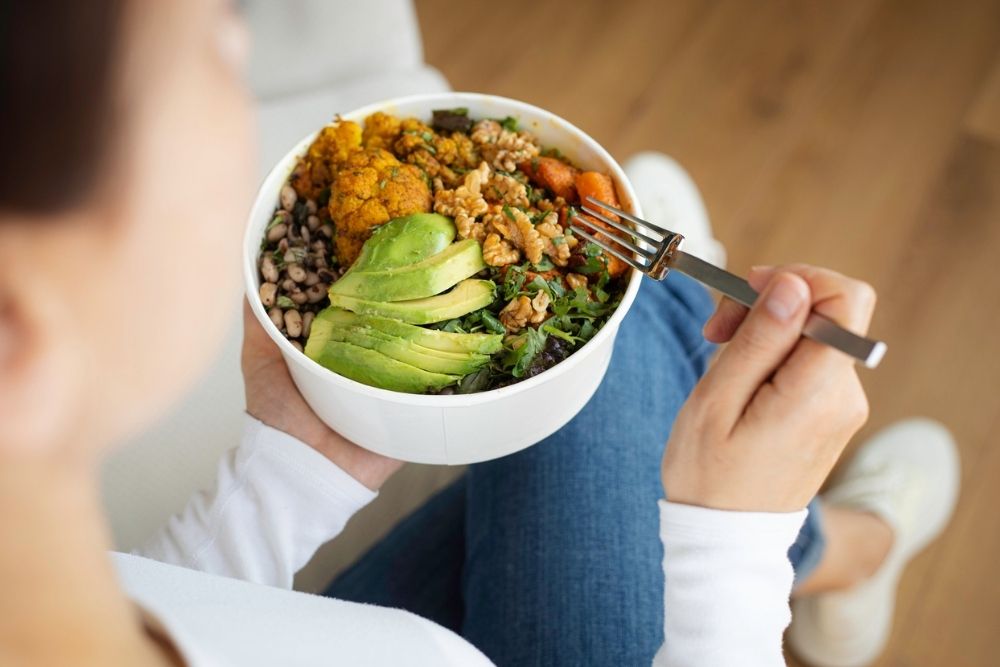Making healthy choices about what you eat and drink is a great way to support your ongoing recovery. To help, we are working our way through the various points during the day when you are likely hungry—and faced with a world of choices ranging from the decidedly unhealthy to healthful options that serve your body, brain, and recovery well.
In the first entry in this series of blog posts, we offered up a variety of suggestions for breakfast and for staying hydrated. In this entry, we will turn our attention to the midday meal and afternoon snacks.
First, our standard disclaimer: We are not nutritionists. If you want advice about your diet tailored to your specific needs, we encourage you to talk with your doctor.
Lunch Can Be a Challenging Meal
When we wrote about breakfast, we mentioned that many people skip the first meal of the day. That problem arises at lunchtime, too.
So many people feel so much pressure to be productive during the workday that they work straight through lunch and miss the meal entirely. That is not the healthiest move—and it certainly does not provide the energy you need to be productive in the afternoon.
Other people realize they should probably eat something, but they tend to wolf down something quick and easy while sitting at their desks. Sometimes that means an energy bar of one kind or another, and sometimes it means something from the company vending machines, are prepackaged food from home. Those are not great options, either, and eating while working is not your best move for your health or your productivity.
Let’s look at some better options.
Making Positive Lunchtime Choices
First, let’s agree that skipping lunch is not the move. Next, let’s stipulate that you really should not eat lunch at your desk. The real way to be productive in the afternoon is to take a real break at midday to relax, eat something healthy, and maybe work in a quick walk. Lunch can also be a great time to connect with coworkers or friends, which supports your recovery by helping you build strong and healthy relationships.
As for what you should eat, we suggest fruits and vegetables, whole grains, and lean proteins. That means a trip to the vending machine or the nearest fast-food joint just won’t cut it. Indeed, the best option might be to pack your lunch each day (here are some great suggestions) so that you can make intentional choices. That, of course, means building in some time in the evening or in the morning to put your lunch together, but the health benefits—and benefits for your recovery—are worth adding this activity to your daily routine.
If you do go out for lunch, just pay attention to what you are ordering. Something as simple as swapping out a basket of fries for a salad or some vegetables can make a big difference.
Now, we know that anytime someone suggests replacing fries with veggies, a collective groan is heard far and wide. We get it—and we want to note that the occasional basket of fries or other indulgence is just fine. Striking a balance that favors healthier choices more of the time is the goal.
How to Choose an Afternoon Snack
A couple of hours after lunch and a couple of hours before the end of the workday, you might find yourself hankering for an afternoon snack. While the nearest candy bar might be tempting, you will be better served by, say, a piece of string cheese, some trail mix, or an apple (with or without peanut butter). If chocolate is calling to you, consider enjoying some dark chocolate, which offers some health benefits that milk chocolate does not.
It might be tempting to drink something caffeinated at this point in the day to help you power through. However, too much caffeine late in the day can have negative consequences later when you are trying to get to sleep. Restful sleep, like healthy eating, is a cornerstone of your recovery, so making a noncaffeinated choice in the afternoon is a good idea. Ideally, your afternoon drink would not be high in sugar either, because the energy boost from sugar is often followed by a crash—and it just isn’t that healthy to consume too much sugar.
Next on the Series Menu
In the third entry in this series, we will take a look at dinner and your late-night snack. In the meantime, remember that you do not have to make all of the changes we recommend to your diet all at once. Every positive change is worthwhile—and all the small changes eventually add up to something big when it comes to your health and your recovery.
We Are Ready to Help
At The Farley Center, which is located in Williamsburg, Virginia, we provide personalized care for substance use disorders and co-occurring mental health disorders. You can count on us to provide holistic care in our residential and partial hospitalization programs. When you are ready to make a lasting change that will improve your life, we are ready to help.


